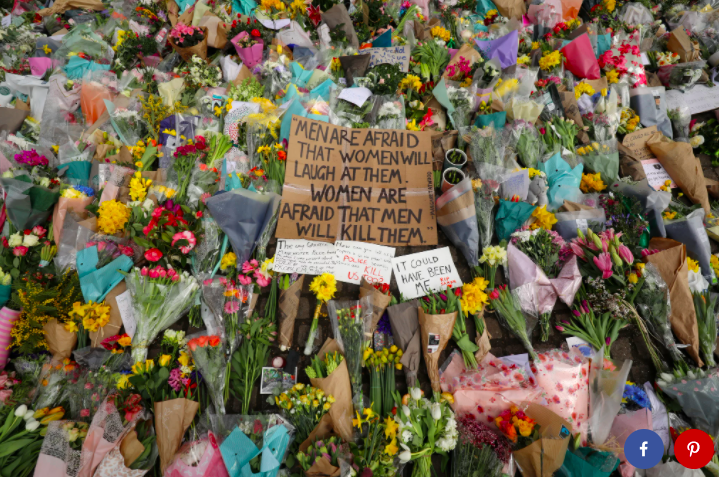The Significance of “The 97 Percent”: Social Media Calls Attention to Sexual Abuse and Assault
May 16, 2021
When walking home from a friend’s house on the evening of March 3, Sarah Everard wore brightly colored clothing, made her journey well before midnight on a weeknight, spoke to her boyfriend on the phone while walking, and took a route that was well-lit and on main roads. Despite all those safety measures, Everard never made it to her South London home.
33-year-old Sarah Everard disappeared and later died after walking home alone. While no circumstances ever warrant or justify an attack, a multitude of people on social media remarked that Everard took numerous precautions to get home safely.
A Met police officer has been arrested and charged with her kidnapping and murder. Following Sarah’s death, women from the UK and all over the world have been sharing stories about their personal experience of sexual harassment, sexual assault, and the repeated microaggressions that make them feel unsafe in public.
The term “97 percent” has been circulating around Instagram and Tik Tok ever since Everard’s death, but what does it mean? A study commissioned by U.N. Women UK, the United Nations entity dedicated to gender equality in the country, released a report in 2021 revealing that 97 percent of women in the United Kingdom aged 18-24 experience sexual harassment. The study also revealed that more than 70% of women of all ages have also had similar experiences. Scrolling through TikTok, users and influencers have been making videos about being ‘a part of the 97 percent.’ The hashtag #97percent has taken social media by storm with 8.2 million views over the past few weeks. In this moment of reckoning and empowerment, women have been exposing the misconduct they face, which is too often normalized and silently endured.
“This is a human rights crisis. It’s just not enough for us to keep saying ‘this is too difficult a problem for us to solve’ – it needs addressing now,” Claire Barnett, executive director of U.N. Women UK, told the Guardian.
To brainstorm ways SLS can take meaningful, lasting action in response to this issue, the Feminism Club discussed the significance of “the 97 percent.” Feminism Club founders Cessa Lewis ‘23 and Moli Ma ‘21 approached the discussion by first explaining the recent events with Sarah Everard and then how the movement started. After giving context, the club leaders turned the discussion over to the members to hear about their reaction.
Laura Haley ‘23 remarked, “It is sad to say that I am not at all surprised. It seems as though every single girl or woman I have spoken to has had at least one experience with sexual harassment or, more commonly, microaggressions such as cat-calling in the streets. If anything, this statistic confirmed my beliefs that this was a much larger problem than people were realizing, and made me hope that some change could possibly come out of this.”
One of Laura’s most interesting takeaways from the meeting was “how so many women brush situations like cat-calling off or chalk it up to ‘men being men.’
“In reality, this type of passive behavior has a massive impact on fixing this issue,” Haley said. “Despite being a form of harassment, we discussed how nobody goes to the police after being cat-called. We simply walk away and forget about it like it never even happened. Things like cat-calling that should not be normalized have been normalized. Not being held accountable in cases where women are touched weirdly on a train or public space or verbally assaulted can become a catalyst for things such as sexual assault and other forms of sexual violence. In the end, accountability, even for the little things, plays a massive role in how we can address this issue and hopefully lower that percentage.”
To address the issues around normalizing sexual harassment and assault, the club plans to give a mediation, during which they will read personal stories and give a voice to other stories. The meditation will be a starting point, and will be followed with discussion in advisories. This is meant to bring awareness to the fact that sexual harassment impacts us all, and we have a vital role to play in ending gender-based discrimination.
Cessa believes these small steps will have a positive influence on the St. Luke’s community. In an email to the Sentinel, Cessa wrote, “If we want to see change in our country and beyond, it has to start in our schools. Our school should be a place where everyone feels safe and comfortable. If we have heightened awareness now, then when we go off to college and the workplace, we’ll inspire a whole new culture[.] We are the new generation; we can create real, lasting change!”
Similar to Laura, I, too, was not surprised by the high statistic of women who face sexual harassment. However, what did shock me was the amount of girls and women I know who are a part of the 97 percent. Cat calling, offensive jokes, sexual comments about appearances, touching, grabbing, and more are considered sexual harassment. My friends, just 15- and 16-year-old girls, tell me about their experiences confronting this behavior, and it is so scary to think that girls my age have already been exposed and normalized to this mistreatment.
The Feminism Club meets every Tuesday during the first half of club time in the Global Classroom. If you are looking for a safe space where you feel comfortable voicing your opinions and concerns, stop by the room. To learn more about the SLS Feminism Club, follow their Instagram @slsfeminism.





Elaine Camerota • Jun 2, 2021 at 3:01 pm
Terrific and important article, Ale.
Cessa Lewis • May 31, 2021 at 8:15 pm
Powerful article Sis!